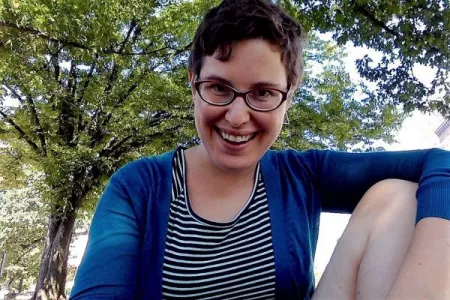The National Socio-Environmental Synthesis Center (SESYNC) is pleased to welcome Dr. Maia Call as a new Postdoctoral Fellow. Maia recently finished her PhD in Geography at the University of North Carolina. Get to know our newest researcher:
Name: Maia Averyl Call
PhD: Geography
Hometown: Washington, NC (not to be confused with Washington, D.C. or Washington State!)
SESYNC Project: Climate, Migration, and Gender in Asia: Unexplored Intersections
How would you describe your primary field of study?
I would describe my primary field of study as human-environment geography or, depending on the audience, environmental demography.
What are the broad questions you are interested in studying?
At the most macro level, I want to know more about how environmental shifts (climate change, yes, but also processes like soil degradation and deforestation) influence livelihood and mobility choices for people in lower-income countries. Going slightly deeper, I am interested in how these decisions are shaped and informed by individual characteristics (e.g., gender), household factors (e.g., wealth), and community attributes (e.g., distance from an urban center).
What inspired you to choose this field of study?
Growing up, I never would have pegged myself as someone who would study geography. All throughout primary and middle school, geography was for me all about map quizzes, which for the uninitiated are those tests where you identify the capital and name of states and countries across the world. I actually only signed up for my first geography course at university level (I was a chemistry major at the time) because as a first-year student, course enrollment options were limited and the 8 a.m. world regional geography course sounded more interesting (and fulfilled more general education requirements) than the other 8 a.m. course options. Thanks to that course, I discovered that geography was not (only) about memorization. That semester, I also came to the realization that I was much more excited about the potential of studying human-environment interactions than chemical reactions. My inspiration for my specific research questions comes out of discussions I have had with Ugandan farmers alongside the mounting evidence that the negative ramifications of global environmental change will disproportionally impact the lives and livelihoods of populations in lower income nations.
Can you briefly describe your proposed SESYNC postdoctoral project?
When people ask me what I study and I mention people and global environmental change, almost invariably someone brings up environmental migrants, or refugees. Research has made it very clear by this point that there is no simple and direct relationship between environmental problems and large-scale, permanent human migration. Nonetheless, the environment does have an influence on human mobility, and scholarship has demonstrated that this impact is informed by factors at the individual, household, and community levels. However, despite the large amount of research on environmental migration, the research community has not yet developed any substantial body of evidence about how gender, and the cultural components that inform it, may influence environmental migration.
To push the field forward in this direction, my postdoctoral research will examine the relationship between climate and migration in the Asian context, with a specific focus on how gender is shaping these patterns. I have chosen the Asian region for this research because from a demographic standpoint one third of the world’s population lives in India and China (two of the countries I will be working on); from a cultural angle, the region is well known to have high gender inequality; and from an environmental perspective, research indicates that this area will be among the first to fully experience the negative impacts of global climate change.
Why is SESYNC the right place to undertake this research?
SESYNC is the right place to undertake this research because it involves a high degree of socio-environmental synthesis. My work brings together internationally collected household and individual survey data, spatial administrative and environmental information, and remotely sensed and modeled climate data products. Projects that combine a lot of data sources are clearly well supported at SESYNC, which is often not the case in standard academic environments. I am also really excited about getting more exposure to ecologists and environmental scientists. Much of my training has focused on the human dimensions of environmental change and I know that it will be so interesting, and benefit me as a researcher, to learn more about the perspective of those more on the natural science side of human-environment scholarship.
What are you reading right now?
Today I am reading The Transcriptionist by Amy Rowland. Just yesterday, I joined the library in my new community (Greenbelt, MD) and this was one of the books that caught my eye when I was browsing the shelves. Reading lists are all well and good, but the serendipitous approach to book selection will never lose its appeal for me.
